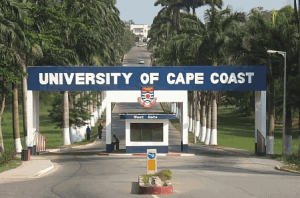UCC, NPC launch report on preventing electoral violence
 A report on preventing electoral violence in selected hotspots in Ghana during the 2016 election have been launched in Cape Coast with a call on Ghanaians not to allow partisan lenses to influence their sense of judgment.
A report on preventing electoral violence in selected hotspots in Ghana during the 2016 election have been launched in Cape Coast with a call on Ghanaians not to allow partisan lenses to influence their sense of judgment.
The report, made up of the findings of a research undertaken by the Institute for Development Studies of the University of Cape Coast (UCC) with support from the National Peace council (NPC) was funded by the United Nations Development Programme (UNDP).
The objective of the research was to document and assess the effectiveness of the strategies adopted by the NPC to prevent violence before, during and after the 2016 elections as well as the existing range factors brought together by the NPC.
The team, led by Professor Stephen Kendie and four others in their research found that the 2016 elections were generally free and fair without the violence that characterised previous elections although there were some marked areas for potential violence.
They indicated that the Inter-Party Dialogue Committees (IPDC) were very useful in some hotspots before, during and after the elections and recommended for it to be institutionalised and scaled up at the constituency level.
The team also recommended that the NPC and its stakeholders focussed and strategised on how to address post elections violence as issues after elections were often overlooked and remained a major security threats to the country.
They further recommended that the NPC strengthened their collaboration with traditional and religious leaders as well as Civil Society Organisations (CSOs) and must be visible at the local level by setting up district offices as required by the Act that established it.
Speaking at the launch, Mr Albert Kan Dapaah, Minister for National Security lamented that the collective disregard for human lives during elections in the quest to attain political power resulted in needless loss of lives.
He said electoral violence remained a major challenge for national security although it was not the only form of violence and affirmed the commitment of his Ministry to work towards eradicating the menace from the body politic of the country.
Mr Kan Dapaah stressed that conflicts should not be allowed to degenerate into violence and advised that if there were any counter decisions between two people from different political parties, they should be calm and resolve it amicably without resorting to violence.
He entreated Ghanaians to learn from the findings of the research which would go a long way to reduce electoral violence in violent prone areas.
He cautioned against the formation of political vigilante groups as they were seen to be spearheading political violence in the society.
Mr Henry Kotey, Deputy Minister of Interior commended the UCC and the NPC for a good work done and pledged the support of his Ministry for such collaborations that facilitated the necessary space for good governance and national development.
He said such researches were relevant for policy and programme decisions in the conduct of subsequent elections in the country and therefore encouraged other academic institutions to undertake similar projects.
He tasked the research team to create public awareness on the identified hotspots for concerned authorities to act quickly to early warning signals that were likely to create electoral violence to provide the appropriate responses for future elections.
Mr Kotey further urged the research team to engage Government and its agencies as well as CSOs on opportunities identified for greater collaborations among the political parties and with other stakeholders for a more peaceful elections in 2020.
He hoped that the successes and challenges in the 2016 elections and the findings of the research would get to all stakeholders to serve as a learning point for future elections in the country.
Source: GNA
